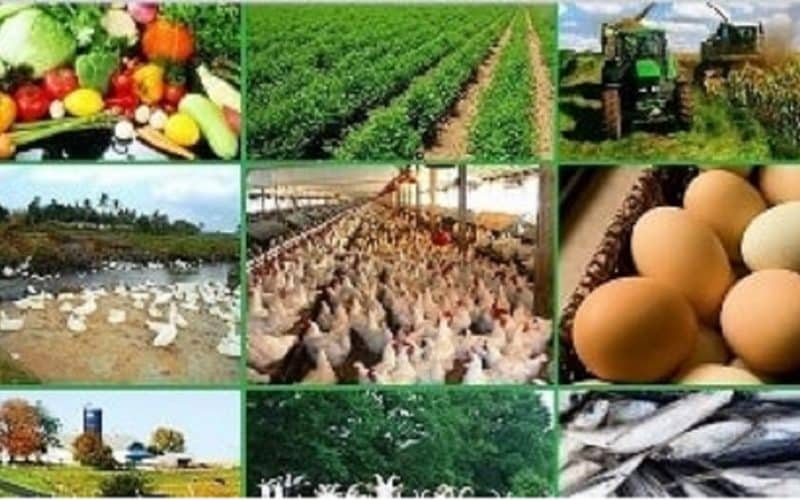Agriculture is the backbone of the Nigerian economy, employing more than 70% of the workers, but many people underestimate its profitability. With urbanization and contemporary technology, farming and agribusiness present enormous prospects, particularly when targeting high-demand markets. A friend of mine expanded their chicken farm by analyzing market needs and exploiting technology early on, which prompted me to look into other profitable agricultural concepts. In this post, I’ll discuss 21 successful agricultural business ideas for 2025, which are ideal for everyone from urban professionals to full-time farmers wishing to diversify.
Why Agriculture is Still a High-Potential Sector in Nigeria
Agriculture is no longer limited to traditional farming practices. Agri-tech breakthroughs, improved infrastructure, and increased access to capital can transform a small-scale farm into a thriving corporation. The Nigerian government has supported agriculture with measures such as the Anchor Borrowers’ Programme, which injected about ₦791 billion from 2016 to 2021, helping over 3.8 million farmers.
Furthermore, Nigeria’s massive population of more than 200 million people is driving up demand for domestically produced food. Experts anticipate that by 2025, urbanization will increase demand for fresh fruit, poultry, and processed meals, offering profitable prospects for agripreneurs who position themselves correctly.
21 Best Profitable Agricultural Business Ideas to Start in Nigeria in 2025
#1. Poultry farming
Poultry farming is still one of the most profitable agricultural industries in Nigeria. With increased demand for eggs and chicken meat, particularly during the holiday season, poultry farmers can make significant profits.
- Why it’s Profitable: Nigeria eats around 1.5 million metric tons of chicken meat each year, and there is an increasing need for poultry goods.
- Initial Investment: Purchase a small chicken enclosure, chicks, and feed for approximately ₦200,000 to ₦500,000.
#2. Fish farming (aquaculture)
Fish aquaculture is another lucrative agricultural business. The most commonly farmed fish in Nigeria are catfish, tilapia, and mackerel. Demand for fish products continues to climb as people become more aware of the health benefits of eating it.
- Why it’s Profitable: The Nigerian fish market is estimated to be worth more than $1 billion per year, with domestic output only meeting around 50% of demand.
- Initial Investment: Set up a modest fish farm costs between ₦500,000 and ₦1,000,000, which includes ponds, fish feed, and fingerlings.
#3. Snail farming
Snail farming (heliciculture) is a sometimes ignored yet highly profitable agricultural industry in Nigeria. Snails are in high demand both locally and internationally, particularly for their nutritional and therapeutic value.
- Why it’s Profitable: Snails are high in protein and low in fat, and people are becoming more aware of their health benefits. They are also easily exported.
- Initial Investment: Starting a modest snail farm with locally accessible supplies can cost as little as ₦100,000.
#4. Crop farming (cassava, maize, and yam)
Due to Nigeria’s vast population, staple crops such as cassava, maize, and yams are constantly in high demand. You can make money by selling both raw produce and value-added goods such as garri, cassava flour, and yam flour.
- Why It’s Profitable: Nigeria is the world’s largest producer of cassava, and the crop is a staple in the diets of millions of people.
- Initial Investment: Start with a modest plot of land, ranging from ₦100,000 to ₦300,000, depending on scale.
#5. Rice farming
Nigeria’s rice consumption continues to rise, and the government has placed import limits to stimulate domestic production. This has generated a significant opportunity for local rice farmers.
- Why it’s Profitable: Nigeria’s yearly rice consumption is approximately 7 million metric tons, with domestic production meeting only 57%.
- Initial Investment: Starting a small rice farm costs between ₦300,000 and ₦600,000 depending on land and equipment prices.
#6. Livestock Feed Production
As poultry, fish, and livestock production expands in Nigeria, so will the demand for low-cost, high-quality animal feed. Producing and selling feed to farmers can yield huge profits.
- Why it’s Profitable: Nigeria’s livestock business is worth billions of dollars, and feed production is a critical component of that ecosystem.
- Initial Investment: A small feed production operation can begin with approximately ₦500,000, which includes machinery, raw ingredients, and packaging.
#7. Organic vegetable farming
As more Nigerians become health-conscious, the demand for organic veggies grows. This movement creates an excellent opportunity for small-scale farmers to raise and offer fresh organic produce to metropolitan markets.
- Why it’s Profitable: Organic produce is more expensive than non-organic, and demand is increasing in cities such as Lagos, Abuja, and Port Harcourt.
- Initial investment ranges from ₦50,000 to ₦200,000, based on farm size.
#8. Goat farming
Goat rearing is another lucrative agricultural industry in Nigeria. Goats are easy to grow and provide several income sources, including meat, milk, and skin, all of which are in high demand.
- Why it’s Profitable: Goat meat is a popular protein source in Nigeria, and goat milk is in high demand due to its nutritious benefits. The leather industry also use goat skin.
- Initial Investment: Purchase goats and build up a goat enclosure with a budget ranging from ₦200,000 to ₦400,000.
#9. Mushroom farming
Mushroom farming is a growing and profitable agricultural enterprise in Nigeria, mainly to rising demand for healthy, low-calorie foods. Mushrooms are easy to grow under regulated conditions.
- Why it’s Profitable: Mushrooms are nutritious and in great demand in cities. Mushrooms are frequently purchased at restaurants, supermarkets, and by health-conscious consumers.
- Initial Investment: Starting a modest mushroom farm can cost between ₦100,000 and ₦250,000 for setting up the growth environment and acquiring spawning.
#10. Beekeeping (Apiculture)
Beekeeping is a valuable enterprise that produces honey, beeswax, and other bee-related products. Honey is consistently in high demand, both locally and internationally.
- Why it’s Profitable: Nigeria imports a large amount of its honey, making local production a great opportunity. Honey has medicinal and culinary use, which increases demand.
- Initial Investment: Start with around ₦100,000 for bee boxes, protective gear, and beekeeping equipment.
#11. Cattle rearing
Cattle ranching is a historic agricultural enterprise in Nigeria, and it is still very profitable due to the need for meat, milk, and leather. It demands more land and resources, but the benefits can be significant.
- Why it’s Profitable: Nigeria’s beef industry is worth billions of naira each year, and cow products such as milk and leather have significant domestic and international markets.
- Initial Investment: Cattle farms typically cost between ₦500,000 and ₦1 million, depending on the quantity of cattle, feed, and farm structure.
#12. Dairy farming
Dairy farming is another profitable industry in Nigeria, particularly with the increasing need for fresh milk and dairy products such as cheese, yogurt, and butter.
- Why it’s Profitable: There is a growing need for locally produced dairy products, as imported dairy products are expensive.
- Initial Investment: Starting a small dairy farm costs between ₦400,000 and ₦700,000 for cows, feed, and equipment.
#13. Pig farming
Pig farming is another rapidly expanding agricultural enterprise in Nigeria. Pigs breed quickly, therefore there is a high demand for pork in Nigeria. The income potential is significant because to the low cost of producing pigs.
- Why it’s Profitable: Pork is becoming a more popular protein source in Nigeria, and the pig breeding cycle allows for the rapid expansion of enterprises.
- Initial investment ranges from ₦200,000 to ₦500,000 for pens, piglets, and feed.
#14. Plantain farming
Plantain is a staple meal in Nigeria, and demand is always strong. It is one of the most simple crops to plant and may survive in many areas of the country.
- Why it’s Profitable: Plantain is adaptable, as it may be sold fresh, processed into chips, or incorporated in a variety of food products. The demand is stable throughout the year.
- Initial Investment: Start a modest plantain farm with ₦100,000 to ₦300,000, depending on land size and seedlings.
#15. Cocoa farming
Cocoa cultivation is a profitable agricultural enterprise, particularly in Nigeria, which is one of the world’s top cocoa producers. It is used in the manufacture of chocolate and other confectionery items.
- Why it’s Profitable: Global demand for chocolate and cocoa goods is increasing, and cocoa continues to be one of Nigeria’s leading exports.
Starting a small cocoa plantation costs between ₦300,000 to ₦600,000 for seeds, land, and early setup.
#16. Oil Palm Farming
Oil palm farming is a profitable business in Nigeria since palm oil is used in cooking and manufacturing. Palm oil is utilized in numerous industries, including food, cosmetics, and biofuels.
- Why it’s Profitable: Palm oil is a staple in Nigerian families, and demand is consistently high. It is also a significant export product.
Starting a modest oil palm farm requires an initial expenditure ranging from ₦200,000 to ₦500,000 for seedlings, land, and setup.
#17. Shea Butter Production
Shea butter is a useful ingredient, particularly in the beauty and cosmetics industries. Nigeria is a major producer of shea nuts, making shea butter manufacture a profitable enterprise.
- Why it’s Profitable: Shea butter is in high demand both locally and globally for usage in skincare and haircare products.
- Initial Investment: Invest between ₦150,000 and ₦300,000 on shea nut processing equipment and raw ingredients.
#18. Poultry Hatchery Business
A chicken hatchery firm raises chicks and sells them to poultry producers. This is a profitable niche in the chicken industry that generates a consistent cash stream.
- Why it’s Profitable: The poultry industry’s rise has created a steady demand for day-old chicks.
- Initial Investment: Start with approximately ₦300,000 to ₦700,000 for incubators, eggs, and hatchery equipment.
#19. Fruit Juice Production
Fruit juice production is a lucrative sector, particularly in Nigeria’s urban areas. With the proper equipment and access to fresh fruit, you may make and sell fruit juice to supermarkets, restaurants, and individuals.
- Why it’s Profitable: Nigerians eat a lot of fruit juice, so manufacturing locally can help meet demand while avoiding the high expense of imports.
Starting a small-scale fruit juice business requires an initial investment of between ₦400,000 to ₦800,000 for processing equipment and raw materials.
#20. Agro-processing (garri, flour, and palm oil)
Agro-processing is the conversion of raw agricultural products into consumer items. This involves turning cassava into garri, palm fruits into oil, and grains into flour. This business adds value to raw materials and boosts profit margins.
- Why it’s Profitable: Value-added items like garri and flour are always in demand, and processed goods are more expensive in the market.
- Initial Investment: Invest between ₦200,000 and ₦500,000 in processing equipment and raw materials.
#21. Feed Mill Business
A feed mill firm manufactures and sells animal feed for livestock such as chickens, fish, and pigs. With the expansion of the livestock industry, feed mills play an important role in assuring farmers’ access to high-quality feed.
- Why it’s Profitable: As the number of livestock farms grows, the need for quality feed rises, resulting in a steady market.
Starting a small feed mill business requires an initial investment of between ₦500,000 to ₦1 million, depending on the volume and type of feed produced.
FAQs About Starting an Agricultural Business in Nigeria
What is the easiest agricultural business to start in Nigeria?
Poultry farming is frequently regarded as one of the easiest agricultural companies to start due to its inexpensive initial investment and quick turnaround time for breeding chickens.
How Much Can I Make From a Small Fish Farm in Nigeria?
A well-managed small fish farm can create a profit of ₦300,000 to ₦600,000 per harvest cycle, depending on location, scale, and market demand.
Is Snail Farming Profitable In Nigeria?
Yes, snail farming is quite profitable. Snails multiply swiftly and require little start-up money. A small-scale snail farm can yield up to ₦500,000 per year.
Template for Starting an Agricultural Business
Here’s a simple template that will help you plan and establish your agriculture business:
Agriculture Business Plan Template
- Business Idea: Clearly identify the agricultural business idea you’re pursuing (for example, fish farming or chicken farming).
- Market Research: Determine your target market and the demand patterns in your region.
- Budget: Determine your start-up expenditures, including land, equipment, and labor.
- Funding: Look at funding sources such as agricultural grants or loans.
- Action Plan: Create milestones for launching and scaling your business.
Key Takeaways
- Nigeria’s agriculture sector has tremendous profit potential, particularly in 2025, as urbanization raises demand for locally produced foods.
- Poultry, fish, and rice farming are among the most profitable agricultural companies, thanks to high demand and government backing.
- Agri-tech and organic farming are creating new chances for innovation and growth in Nigeria’s agriculture sector.
- Low startup costs make snail farming and organic vegetable gardening viable options for a diverse spectrum of enterprises.
- Investing in livestock feed production can help diversify your agricultural income by supporting the rising livestock industry.
Conclusion
Agriculture in Nigeria is no longer limited to subsistence farming. With the appropriate strategy, any of these 21 business ideas have the potential to be profitable, especially as Nigeria’s population expands and food consumption increases. Whether you’re a full-time farmer or a professional seeking a side gig, there’s a job for you in Nigeria’s expanding agricultural sector.
Which of these company ideas appeals to you the most, and how do you intend to start?
- BUSINESS FARMING: Profitable Ideas on How to Start a Small Farm Business
- SMALL SCALE BUSINESS IDEAS 2024: (50+ideas +Business plans)
- POULTRY BUSINESS: Beginners’ Guide to Launch a Lucrative Poultry Business
- Top 10 Universities In Nigeria That Are Redefining Excellence In 2024
- Largest Shipping Companies In Nigeria In 2024





